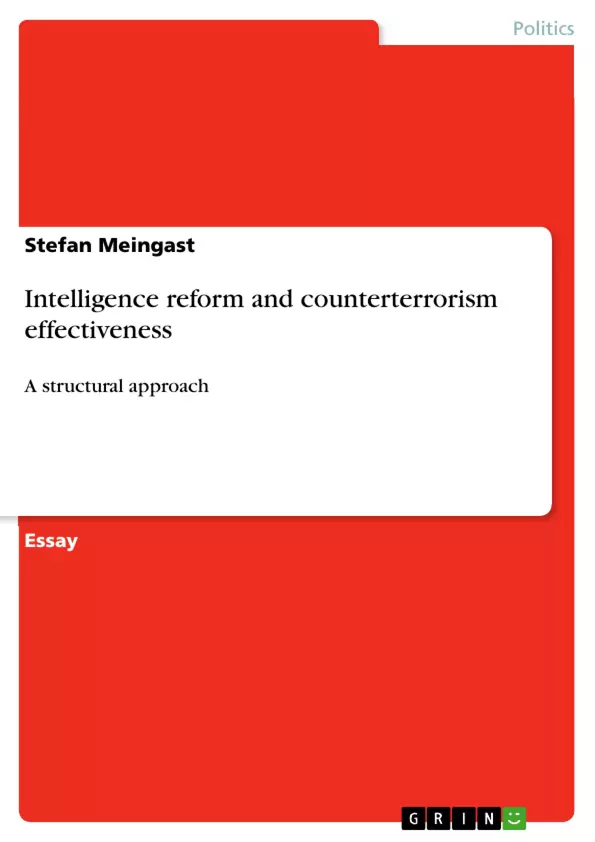Subsequent to the 9/11 terrorist attacks, a sustained effort has been undertaken to reform the American intelligence agencies. The establishment of a terrorism “czar”, with more authority than the Director of the CIA used to have as coordinator of the intelligence enterprise and with a supporting bureaucratic structure to this end should lead to more unified, coordinated and effective intelligence, in particular in the context of counterterrorism. The Intelligence Community has undergone previous organisational “centralisation” reforms, and yet, it failed to provide timely and accurate intelligence about the 9/11 terrorist threat. A series of legitimate questions therefore arise: is centralisation the wrong solution to the problem of intelligence effectiveness? Is rather decentralisation the key? Has structure any influence on the way intelligence agencies perform? Answering these questions would reveal whether the adjustments to the structure of the Intelligence Community are justified or, on the contrary, determined by empirical fallacies, such as the “quick-fix” reorganisation syndrome. In a broader context, it would be also useful to know whether and how the effectiveness of counterterrorism intelligence could be improved by means of organisational structure.
This research question implies the scholarly literature of two disciplines: organisation theory and political science (International Relations and Security Studies – Terrorism). The nature and functioning of organisations, in particular, decentralisation and its effects on effectiveness have been studied at the level of business and bureaucratic organisations, whereas studies on intelligence and its effectiveness are present within a broad range of security studies areas, including the newer – terrorism/ counterterrorism. Answering the above research question would therefore mean applying theories and evidence in the organisation theory and organisational behaviour literatures to the terrorism/ counterterrorism one.
Inhaltsverzeichnis (Table of Contents)
- I. Introduction.
- II. Theory
- a) Organisation theory.
- b) Counterterrorism, intelligence, effectiveness..
- III. Reform........
- IV. Centralising / Decentralising the Intelligence Community ..
- a)
- b) Precautions
- 1. Structure has nothing to do with Counterterrorism Intelligence effectiveness ...
- 2. Does centralisation make efficient intelligence? ..
- 3. Control variables Decentralisation, network, effectiveness....
- V. Conclusion..
- VI. Bibliography..
Zielsetzung und Themenschwerpunkte (Objectives and Key Themes)
This paper explores the relationship between intelligence reform and counterterrorism effectiveness, particularly focusing on the structural approaches to improving the American intelligence community. The paper aims to determine if centralisation or decentralisation is more effective for counterterrorism intelligence, and whether organisational structure truly impacts the effectiveness of intelligence agencies.
- The effectiveness of counterterrorism intelligence
- Centralisation vs. decentralisation in intelligence structures
- The role of organisational structure in intelligence agency performance
- The impact of control variables, such as human intelligence and technology
- The concept of "network" as an ideal structure for counterterrorism intelligence effectiveness
Zusammenfassung der Kapitel (Chapter Summaries)
- I. Introduction: This section sets the context by examining the historical use of reorganisation as a solution to administrative and political problems, highlighting its potential for efficiency and effectiveness. The paper then introduces the 9/11 terrorist attacks and the subsequent efforts to reform the American intelligence agencies, posing critical questions about the effectiveness of centralisation and the role of structure in intelligence performance.
- II. Theory: This chapter delves into organisational theory, defining organisations as complex systems with specific features like specialisation, routinisation, and organisational culture. The section examines centralisation and decentralisation, discussing their respective advantages and disadvantages, including the impact on decision-making, effectiveness, and flexibility.
- III. Reform: This section explores the specific details of intelligence reform, examining the role of the Director of National Intelligence and the changes implemented in the wake of 9/11. It discusses the challenges and potential benefits of these reforms.
- IV. Centralising / Decentralising the Intelligence Community: This chapter delves into the central arguments surrounding centralisation and decentralisation within the intelligence community. It considers the null and counterhypotheses regarding the relationship between structure and effectiveness, along with control variables like human intelligence and technology. It also explores the concept of a "network" as an alternative structure for counterterrorism intelligence.
Schlüsselwörter (Keywords)
The paper focuses on key terms like counterterrorism, intelligence effectiveness, centralisation, decentralisation, organisational structure, human intelligence, technology, and the concept of "network" as a potential model for improving intelligence performance in the context of counterterrorism.
Frequently Asked Questions
Does centralizing intelligence agencies improve counterterrorism effectiveness?
The paper questions this common assumption, exploring whether structural centralization after 9/11 actually leads to better intelligence or if it is merely a "quick-fix" reorganization syndrome.
What is the "quick-fix" reorganization syndrome?
It refers to the tendency of political leaders to respond to failures by changing organizational structures, which may not address the underlying issues of intelligence performance.
Is decentralization a better alternative for intelligence agencies?
The research explores the benefits of decentralization and "network" structures, which may offer more flexibility and effectiveness in dealing with modern terrorist threats.
What role do technology and human intelligence play in effectiveness?
They are considered control variables. Structure alone might not be the key; the quality of human intelligence (HUMINT) and technological tools are crucial for success.
What disciplines are involved in this research?
The study combines organizational theory, which looks at how bureaucracies function, with political science and security studies focused on counterterrorism.
- Citation du texte
- Stefan Meingast (Auteur), 2005, Intelligence reform and counterterrorism effectiveness, Munich, GRIN Verlag, https://www.grin.com/document/89129



